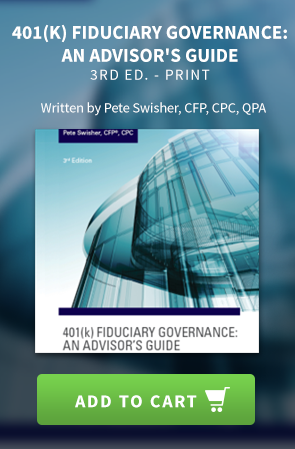IRS Issues
Open your calendar and reserve Feb. 6-8, 2022—for the 2022 NTSA Summit!
Our Summit is the only industry conference designed for 403(b) and 457(b) professionals. And it will include:
Six general sessions, an array of workshops, and continuing education (CE) credit.
The Certified Retirement...
READ MORE
A recent survey of insurers highlights the criteria that a number of the nation’s leading fiduciary liability insurers identified as the biggest sources of fiduciary risk, writes Nevin E. Adams, JD, in MarketBeat. However, the report’s authors note that it was specifically focused on sources of...
READ MORE
The American Retirement Association in an Oct. 4, 2021 letter to the IRS has recommended that the IRS continue its efforts to promote plan sponsor compliance and reduce the burden of plan sponsorship by modifying the Employee Plans Compliance Resolution System (EPCRS) to permit a sponsor that...
READ MORE
The American Retirement Association (ARA) has called on the IRS to make its temporary relief from the physical presence requirement for spousal consents permanent.
In a Sept. 30 letter, the ARA and 15 other organizations tell the IRS that they “appreciate the relief and extensions the Service...
READ MORE
Tech Talk discusses what the IRS means by “written 403(b) plan.”
READ MORE
The IRS on Sept. 28 updated the Issue Snapshot in which it discusses the laws and regulations governing plan loans.
Many retirement plans make it possible for participants to take out loans against their retirement accounts, although plans are not required to do so, the IRS reminds. Qualified...
READ MORE
Tech Talk addresses what happens to balances when a 457(b) plan is terminated.
READ MORE
It is possible that sometimes an employee’s elective contribution may not timely deposited for a variety of reasons. In MarketBeat, John Iekel writes about a blog entry that points out that there are consequences to that, as well as ways to address such a situation.
READ MORE
Understanding key compliance areas can help ensure your plan complies with 403(b) regulations.
Did you know that, technically, the IRS 403(b) regulations do not require an employer to adopt a 403(b) plan document? A public school or a 501(c)(3) nonprofit organization with a 403(b) plan must...
READ MORE
While it is more common than not for an employer to offer a retirement plan, still there are some that do not. The IRS offers information and materials for those that are considering offering a retirement plan—which, in turn, can be helpful information to provide potential clients and customers...
READ MORE
Mega-Roth, backdoor IRAs and large retirement account balances would be limited under legislation approved Sept. 15 by the House Ways and Means Committee.
In a near party-line vote of 24-19, the changes were approved as part of the $3.5 trillion Build Back Better Act reconciliation recommendations...
READ MORE
The House Ways and Means Committee has revealed that it intends to partially pay for the $3.5 trillion reconciliation bill through a series of limitations on upper-income individuals’ retirement savings.
The retirement proposals are included in Subtitle I titled “Responsibly Funding Our...
READ MORE
The IRS has modified its process for issuing opinion letters for Cycle 2 amendments and changed the Section 403(b) pre-approved plan process to conform more closely to the procedures in the Section 401(a) pre-approved plan process.
Under Rev. Proc. 2021-37, issued Sept. 1, changes to the 403(b)...
READ MORE
The IRS has updated the information it provides concerning an aspect of aggregation of a 403(b) plan. Specifically, it addresses the application of Code Section 415(c) when a 403(b) plan is aggregated with a 401(a) plan.
Section 415(c)
In this Issue Snapshot, the IRS notes that Section 403(b)...
READ MORE
Tech Talk addresses whether distributions from 403(b) plans and governmental 457 plans to cover qualified birth or adoption are distributions.
READ MORE
Every plan has participants—and, sooner or later, will therefore have “ex” participants—and sometimes those participants go…missing. And that can be a real problem for retirement plan fiduciaries, writes Nevin E. Adams, JD, in MarketBeat. He adds that while most are likely aware of the fiduciary...
READ MORE
The increased prevalence of defined contribution plans has heightened the importance of portability and the rules and circumstances affecting it, says a recent analysis that addresses common questions that arise as a result.
In “In-Plan Guaranteed Lifetime Income: Debunking Portability Myths,”...
READ MORE
When hiring a new employee, one of the initial tasks given to that employee is completing various beneficiary forms for the company’s benefit plans. Most people will fill it out and not think about that initial election ever again. Some employees may not fill one out at all. So, why is it a big...
READ MORE
The IRS has updated the information it provides concerning written plan requirements for 457(b) deferred compensation plans.
Generally, for years beginning after Dec. 31, 2001, an eligible deferred compensation plan under Code Section 457(b) must meet written plan document requirements.
In its...
READ MORE
This is a pretty exciting time in the defined contribution plan marketplace. Years of work from a number of different quarters seem to be finally beginning to coalesce around the notion of sanely “decumulating” assets from DC plans. I wonder if a measure of all this may be the growing catalog of...
READ MORE


